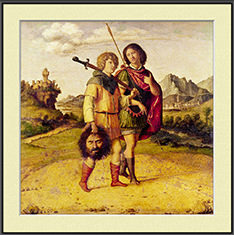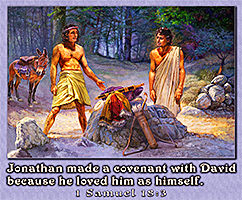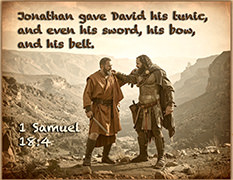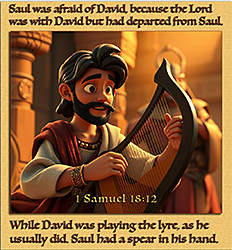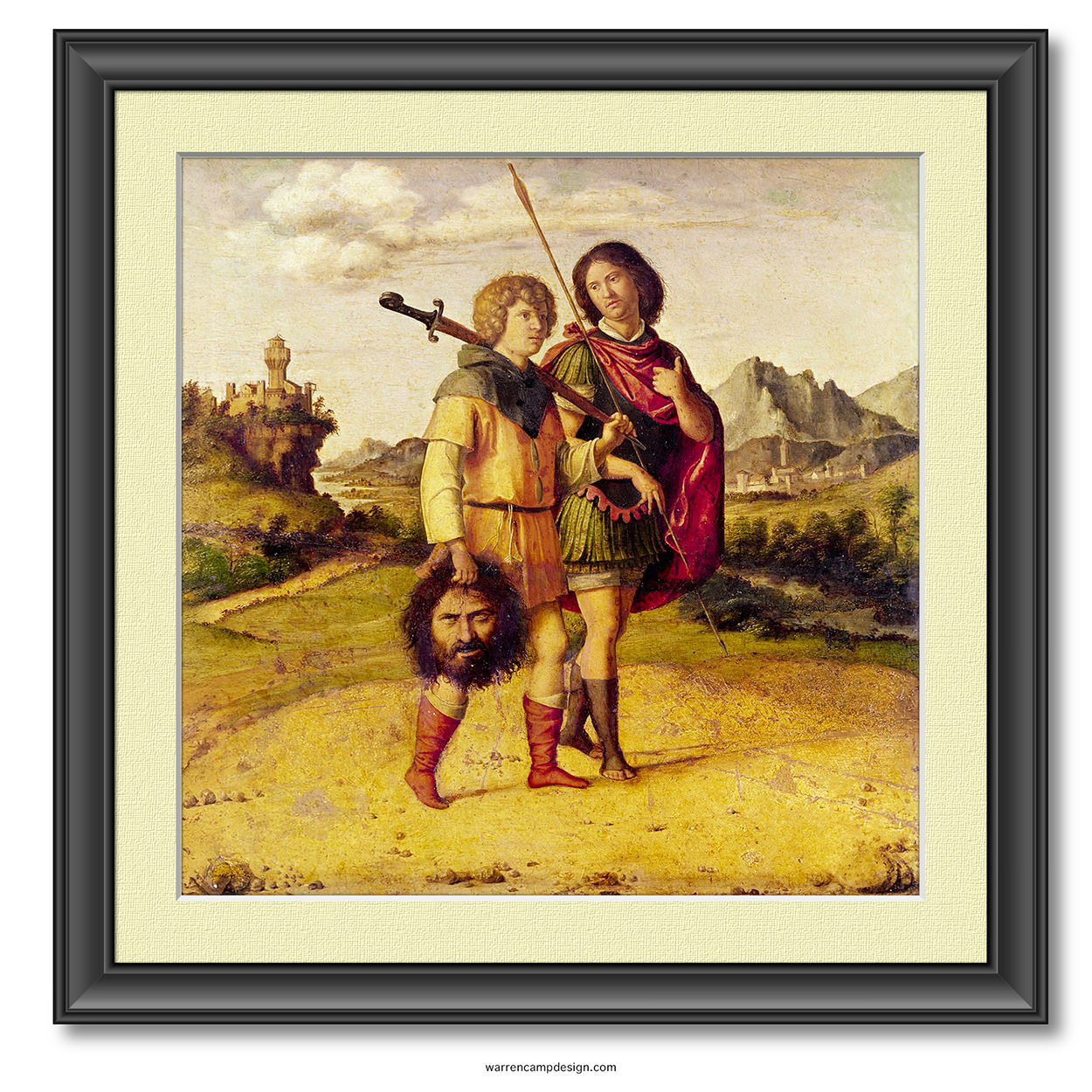1 Samuel 18:1–30 . . . Bible Study Summary with Videos and Questions
“Fostering True Friendship”
We all agree that we long to be in genuine relationships with people. God created us with that need; we weren't meant to live in isolation. Healthy and meaningful friendships don't just happen; they require intentional effort.
Chapter 18 starts off by introducing the relationship that David and Jonathan (Saul's son) have begun to develop (vv. 1–4), becoming biblical models of godly companions. Seeing how healthy and attractive their relationship was, Saul began to struggle with his anger, fear, and jealousy of their bond (vv. 5–16). The following passage details how Saul and his servants conspired to kill David covertly and overtly.
The chapter ends with Saul realizing that the Lord was with David, and that Saul's younger daughter, Michal, loved David. Saul then saw yet another opportunity to get David killed, after becoming even more afraid of David who was continually victorious in his military pursuits. Clearly, Saul would become David's arch-enemy for his remaining days. In the remaining three chapters, the biblical account of David and Jonathan can help us learn how to foster genuine friendships, built upon a foundation of mutual respect, love, and authentic commitment.
[Note: Click the link to This Week’s Passage near the bottom of this page to read today’s Scripture.]
A Covenant of Friendship Blossoms (18:1–4)
Saul’s Growing Fear of David
18 1After David had finished talking with Saul, Jonathan became one in spirit with David, and he loved him as himself. 2From that day Saul kept David with him and did not let him return home to his family. 3And Jonathan made a covenant with David because he loved him as himself. 4Jonathan took off the robe he was wearing and gave it to David, along with his tunic, and even his sword, his bow and his belt. (1 Sam. 18:1–4).
When you read those opening verses, it's quickly apparent that Jonathan and David were becoming biblical models of godly companions. Their friendship is renowned for its depth, loyalty, and spiritual foundation, making it a biblical model of godly companions whose bond transcended status, jealousy, and rivalry. Clearly, mutual respect for one another is vital in a healthy friendship. But we ought to appreciate two additional aspects of their relationship: The men had an emotional love for one another and their hearts were knit together (v. 1). When one man experienced joy or sadness, the other man felt it too.
Jonathan was a lot like David. They were approximately the same age, with Jonathan probably approximately five years older. The two were bold men having a great trust in God; they were also men of action. Most of all, both men had a genuine relationship with God. At the same time, they were different. Jonathan was the first-born son of a king while David was the last-born son of a farmer, which made Jonathan more than a prince; he was the crown prince who'd, by everyone's expectation, become the next king of Israel.
We see in this passage the idea of "covenant" (Hebrew: berît), which is more personal; it's an "alliance of friendship" between individuals. The word is used several times in these chapters (18:3; 20:8, 16) where the nature of this covenant is developed further. Notice that their covenant was sealed by gifts: a robe, tunic, sword, bow, and belt, from Jonathan to David. We have the same covenant confirmation with the use of a ring in our wedding services.
In addition, they had genuine devotion to one another, which is a type of commitment that involves giving. To show loyalty, Jonathan gave his friend material items: his robe, tunic, and weapons: his sword and bow (v. 4). But both men selflessly offered each other more. Jonathan even risked his life and future kingship in order to save David from pending execution. Notice, too, that Jonathan was often the initiator and the one who gave more. He was a prince, whereas David was a lowly shepherd. That shows us that social status should never interfere with cultivating a true friendship. We must develop sincere, genuine, and hearty friendships. Doing so requires time, selfless devotion, and transparency, which means being honest about our faults. Taking such a risk requires trust, however, acquiring a genuine relationship(s) is well worth the effort!
Comparing One’s Self with Others (vv. 5–16)
It's interesting to see in v. 5 that Saul's officers were pleased by David's advancement in rank. You'd expect officers to be jealous of David's rapid promotion and possibly feel threatened. But they weren't. They recognized David as having truly earned his position and were pleased to see his achievement recognized. This is evidence of David's personal charisma that attracted people to him, which we'll soon see when David will begin to build his own army after fleeing from Saul (22:2).
Each of us has personal hopes, plans, and expectations for our lives. It's better when they're all inspired by God. What we see others experiencing may not be what he has in store for us. So, when you compare yourself with talented others, watch out! Jealousy often lurks behind the next curtain. Consider this same situation for King Saul.
6When the men were returning home after David had killed the Philistine, the women came out from all the towns of Israel to meet King Saul with singing and dancing, with joyful songs and with timbrels and lyres.7As they danced, they sang: “Saul has slain his thousands, and David his tens of thousands” (1 Sam. 18:6–7).
Appointed by the Lord to become Israel's first king, Saul was graciously given power and godly success. But when he heard women praising David for his great victory over Goliath, he became envious, fearful, angry, and suspicious. He began to fear losing his kingdom; eventually, his own jealousy led to losses of relationships, position, and power. This may seem like an extreme example. Yet, if we honestly examine ourselves, we'll likely realize that that envy is hiding somewhere in our hearts. Most often, insecurity, selfishness, or pride is behind a jealous mindset. In fact, all three were evident in Saul's life: He was scared that he'd be outdone and overtaken; he didn't want to share the glory with God; he was insulted that a mere shepherd boy would outperform him, the king.
Saul’s story highlights how envy and comparison can quickly undermine the blessings God has given. When Saul encountered David’s victory and the praise he received, he allowed jealousy to disturb his peace, leading to fear, anger, and suspicion instead of gratitude for God's many gifts. For us, our eyes should focus on our walk with the Lord. Choosing to focus on a personal walk with Jesus, rather than comparison or rivalry, leads to lasting joy and spiritual growth. He created each of us differently; his plan for every individual's life is unique. Thank God, now, for that!
10The next day an evil spirit from God came forcefully on Saul. He was prophesying in his house, while David was playing the lyre, as he usually did. Saul had a spear in his hand 11and he hurled it, saying to himself, “I’ll pin David to the wall.” But David eluded him twice.
12Saul was afraid of David, because the Lord was with David but had departed from Saul (1 Sam. 18:10–12).
In vv. 10–12, we see David returning to his former duty as court musician, however, this time Saul is well-aware of who David is and how hugely popular he's become among the people. During one particularly violent episode, Saul threw a spear at David, not once, but twice! Note the dual motives in v. 12: (1) fear and (2) jealousy. Saul was out of control!
For David, the same hands that had killed Goliath and carried the trophy of his severed head were now sweetly playing music unto the Lord, using a lyre, ministering to a king who was troubled by a distressing spirit. David obviously had skillful hands, both in war and in music ministry. But what a humble and devoted heart David had! Most men, after receiving the fame that came to David, would consider this kind of service "beneath" them. David was a general in the army, famous in all Israel, and had women dancing and singing his praises. Yet he still performed responsibly by personally ministering to Saul with healing music. Ironically, David held a harp, and played music with his hands, while Saul's hand held a spear of violence. What a contrast between David and Saul!
We see next in v. 13 that Saul's intention to promote David militarily was a two-fold one: (1) to get David away from him and out of his court, and (2) to put him in a dangerous place so that he'd surely be killed. We'll see this skit played out in vv. 17b and 21, however, Saul's plan backfired. Because the Lord was intentionally with David, he had great success (vv. 14–16). Instead of being killed in battle, David proved to be both a powerful warrior and a leader of men. He led them to victory and was consistently successful in his pursuits, which brought him even greater publicity and adulation among the people.
Family Affairs — Daughters Merab and Michal (vv. 17–22)
Time after time, Saul would continue to try to kill David. Shrewd and deceitful, Saul's first tempting offer to David allowed him to have Saul's daughter in marriage. This offer of his daughter in marriage wasn't the reward that he promised the one who slew Goliath (17:25); this offer was made with strings attached: David was required to continually fight against the Philistines, thereby increasing the chances that he'd be killed in battle. David demonstrated wisdom, humility, and realism in his response to Saul's offer when he asked: "Who am I, and what is my family or my clan in Israel, that I should become the king’s son-in-law?" Because David was unable to afford a bridal gift fit for the king's daughter, Saul reluctantly married his older daughter, Merab, to someone else.
But when Saul heard that his younger daughter, Michal, was in love (Hebrew: ʾāhab) with David, he realized yet another opportunity to get David killed. So he appealed to David's macho pride and his military prowess and succeeded in his follow-up plot. He declared that the price for a man to be married to his younger daughter wasn't finance-based, but required military success. When David accepted the king's offer, Saul told him, "Now you have a second opportunity to become my son-in-law."
The Plot Thickens (vv. 23–30)
23They repeated these words to David. But David said, “Do you think it is a small matter to become the king’s son-in-law? I’m only a poor man and little known.”
24When Saul’s servants told him what David had said, 25Saul replied, “Say to David, ‘The king wants no other price for the bride than a hundred Philistine foreskins, to take revenge on his enemies.’” Saul’s plan was to have David fall by the hands of the Philistines (1 Sam. 18:23–25).
Clearly, in v. 25, Saul resorted to being more subtle in his deceitful efforts. He conveyed his words and motivations secondarily through his conspiring attendants, rather than speaking directly with David. The opportunity to marry the king's daughter, especially if he'd be able to pay the requisite bride price by utilizing his own efforts, albeit militarily, pleased David. So he took Saul up on his offer. However, instead of acquiring 100 Philistine foreskins, David and his men doubled the amount! They killed 200 Philistines, circumcised the corpses, and delivered the numerous foreskins to Saul.
Despite the fact that David had been fighting successful battles for Israel while securing the kingdom for Saul, the king remained extremely jealous of David. "When Saul realized that the Lord was with David and that his daughter Michal loved David, Saul became still more afraid of him, and he remained his enemy the rest of his days" (vv. 28–29). In retrospect, this eight-verse passage can possibly be viewed as perhaps (a) “Love as a Weapon: Saul's Twisted Scheme”, (b) “From Shepherd to Son-in-Law: A Humbling Ascent,” or (c) “The Vicious Cycle of Jealousy vs. The Victorious Life of Faith.”
Hearty Review — The Importance of Covenants, Again and Again
Much to his distress, Saul had given David his daughter’s hand in marriage, which represented more than having his plans fail, again. Even worse, David again succeeded. Now Saul, who greatly feared David and wanted him eliminated, had two of his own family members bound to David by love and a covenant. Chapter 18 begins with the account of Jonathan’s love for David and his covenant with him; the chapter ends with Michal’s love for David and her marriage covenant with him. Somehow David managed to win over two members of Saul’s immediate family. Those on whom Saul assumed he could depend to help get rid of David were on David’s side. Saul, his plans, and his kingdom were falling apart.
† Summary of 1 Samuel 18:1–30
This thirty-verse passage depicts the aftermath of David’s victory over Goliath and traces the rapid changes in his relationship with King Saul and Saul’s family. David forges a deep friendship with Jonathan, Saul’s son, who loves David as his own soul and makes a solemn covenant with him, symbolically giving David his robe and weapons — marks of honor and allegiance (18:1–4). David is given increasing responsibilities by Saul, succeeds in all his missions, and earns the love and admiration of the people and Saul’s officers (vv. 5, 16, 30). However, as songs of celebration declare David’s exploits greater than Saul’s, the king becomes intensely jealous and tries repeatedly to harm David, even hurling his spear at him (vv. 6–11).
Saul’s fear and animosity deepen as he realizes the Lord is with David but has left him, leading Saul to plot further against David by appointing him commander and hoping he will fall in battle (vv. 12–17). Saul offers his daughters Merab and Michal to David; when Michal loves David, Saul sees this as an opportunity to entrap him. He demands a dangerous bride price — the foreskins of 100 Philistines — hoping David will perish, but David succeeds beyond expectation and marries Michal (vv. 17–27). Saul’s fear and hatred only grow as David’s wisdom, reputation, and favor with Israel expand, highlighting God’s continued presence with David (vv. 28–30).
Key points with verse references:
• Jonathan’s deep friendship with David is marked by a covenant and symbolic gifts (vv. 1–4).
• David is successful in all Saul’s assignments, gaining popularity with the people and Saul’s officials (vv. 5, 16, 30).
• Saul becomes jealous and fearful of David, attempts to kill him, and dreads his growing fame (vv. 6–11, 12, 15).
• Saul tries to entrap David with dangerous missions and by offering his daughters as wives, but God grants David favor (vv. 17–27).
• Despite Saul’s schemes, David’s wisdom, favor, and success continue to increase, while Saul’s fear and hostility deepen (vv. 28–30).
This Week's Passage
1 Samuel 18:1–30
New International Version (NIV) [View it in a different version by clicking here; also listen to chapter 18 narrated by Max McLean].
† Summary Video: “The First Book of Samuel”
† Watch this introductory video clip created by BibleProject on bibleproject.com.
- Q. 1 Do you already have a godly companion who serves as your accountability partner? How's that working for you?
- Q. 2 What was David's chief motivation for marrying Michal? Military pride? Obedience to King Saul? Love or desire for Michal? The desire to kill Philistines?

